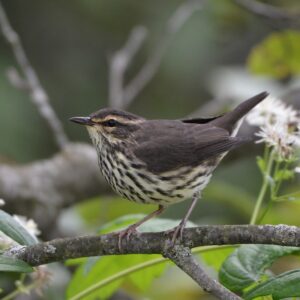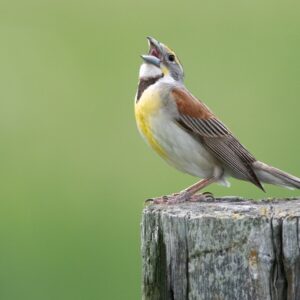Bedford Biofuels Threatens Kenya’s Tana Delta
Nature Canada is concerned that a Canadian company – Bedford Biofuels – plans plans to set up a jatropha tree plantation in Kenya’s Tana Delta, an area that provides refuge for 350 bird species. When we learned of the Calgary-based company’s plans last year, we contacted the company to discuss the potential impacts on biodiversity of the proposed project. The company did not respond to our letter, but recent developments make us hopeful that Bedford Biofuels will abandon this project. The latest news from our BirdLife colleagues in Kenya is as follows:
A Nairobi newspaper reports that, after consideration of the scientific evidence, Kenya’s National Environment Management Authority (NEMA) has decided to advise the Kenyan Government to halt the planting of the biofuel crop jatropha within the Coast region of Kenya. Proposed jatropha plantations would do irreparable damage to coastal Important Bird Areas (IBAs), including the Tana Delta and Dakatcha Woodlands.
The reported decision has been applauded by BirdLife Partner NatureKenya, which has been fighting a vigorous campaign against the destruction of woodland and other coastal habitats to make room for biofuel crops. NatureKenya also provided much of the evidence on which NEMA’s decision was based, especially recent research which has cast doubt on the supposed benefits of jatropha as a “green” alternative to fossil fuels. Scientific studies now recommend growing jatropha only as a hedge or living fence.
Even before NEMA’s decision, a company planning to grow oil seed crops on 28,000 hectares of the Tana Delta pulled out after consultations with NatureKenya and other BirdLife Partners, citing concerns over environmental impacts and long-term climate change effects.
In July, two directors of NEMA were suspended after accusations that they had acted irregularly in granting a licence to the Canadian company Bedford Biofuels to grow jatropha on a 10,000 hectare “pilot” site in the Tana Delta. According to the Nairobi press, NEMA’s Chairman, Mr Francis Ole Kaparo, said that the licence had been awarded in spite of mounting scientific evidence which has exposed the claims made for jatropha as false. “There is nothing to prove jatropha is viable. In fact, all evidence shows it has failed,” Mr Kaparo is quoted as saying.
NEMA has advised the Kenyan government to cancel Bedford’s licence, but the company is challenging the cancellation. Bedford’s local representatives have organised demonstrations in favour of the jatropha plantations, which have been described as an attempt to “intimidate” the authorities.
“We congratulate the NEMA Chairman, Mr Francis Ole Kaparo, the NEMA Director General Dr Ayub Macharia, and NEMA technical staff for their wise decision”, said NatureKenya CEO Paul Matiku. “NEMA is on the right path to sustainable development, by using science to avoid irreversible environmental, social and economic costs. We hope the Ministry will follow this advice and cancel Bedford Biofuel’s licence for a ‘pilot’ of 10,000 hectares of jatropha at Tana, and that this wise decision has been made clear to Kenya Jatropha Energy Limited at Dakatcha.”
He added: “Globally, biofuel crops, originally viewed as substitutes for climate-damaging fossil fuels, have replaced food crops and natural habitats, leading to rising food prices and loss of critical wildlife habitats and ecosystem services.”
The Tana Delta has long provided local communities with food and livelihoods. Its value to the nation includes ecosystem services such as water storage, shoreline protection and marine life spawning grounds. It also has huge tourism potential. But as demand for land to grow commodity crops has increased globally, the Tana Delta has become the focus of interest for international speculators and investors.
“Over the last decade, conflicts have been increasing in the Tana Delta as the demands for competing land uses, natural resources, nature conservation and community interests have intensified,” said Paul Matiku. “It is for this reason that NatureKenya and stakeholders, led by the Office of the Prime Minister, are initiating a combination of strategic planning and integrated assessment to develop a long term General Management Plan.”
Bedford Biofuels commented on September 13, 2011:
/* Style Definitions */ table.MsoNormalTable {mso-style-name:”Table Normal”; mso-tstyle-rowband-size:0; mso-tstyle-colband-size:0; mso-style-noshow:yes; mso-style-priority:99; mso-style-qformat:yes; mso-style-parent:””; mso-padding-alt:0cm 5.4pt 0cm 5.4pt; mso-para-margin:0cm; mso-para-margin-bottom:.0001pt; mso-pagination:widow-orphan; font-size:11.0pt; font-family:”Calibri”,”sans-serif”; mso-ascii-font-family:Calibri; mso-ascii-theme-font:minor-latin; mso-fareast-font-family:”Times New Roman”; mso-fareast-theme-font:minor-fareast; mso-hansi-font-family:Calibri; mso-hansi-theme-font:minor-latin; mso-bidi-font-family:”Times New Roman”; mso-bidi-theme-font:minor-bidi;} Recently, articles such as this, riddled with misleading errors and false accusations have been circulating regarding Bedford Biofuels’ 10,000 ha Jatropha biofuel project in the Tana Delta Region of Eastern Kenya. These articles were published without input from Bedford. Bedford also did not recieve correspondence from Nature Canada before this post was published.
Contrary to what is being reported by Nature Kenya, Bedford’s license to plant has not been revoked. The EIA (Environmental Impact Assessment) license was issued to Bedford on May 25, 2011 by NEMA (National Environment Management Authority)Kenya and remains in effect. Nursery preparations began in July and the Jatropha seedlings will be transplanted starting in November.
Nature Kenya has also erroneously reported that Bedford intends to plant Jatropha in the delta area of the Tana Delta Region, which is causing concern because of the delta’s biodiversity and ecological importance. First and foremost, in order to obtain its license from NEMA, Bedford had to complete an Environmental Impact Assessment of the Tana Delta Region which included thorough research pertaining to the wildlife, existing flora and soil conditions. Approval of the EIA License was granted under the condition that Bedford agrees to abstain from planting in the delta.
Second, Jatropha will not grow in flood plains or areas of standing water such as a delta, it thrives in semi-arid to arid conditions. In order to maximize our yields, Bedford has engaged the world’s leading experts in Jatropha and has a team of agronomists experienced in growing Jatropha to advise the optimal growing conditions and location for Bedford’s Jatropha project.
Lastly, Bedford is an advocate of conserving the environment and is currently working alongside the Lower Tana Delta Conservation Trust to ensure that the delta area is preserved and the local community’s standard of living is improved.
Nature Kenya has also been vocalizing it’s skepticism about the benefits of Jatropha as a “green” alternative to fossil fuels and recommends that Jatropha should only be grown as a hedge or living fence. This makes sense if you are a trying to prevent a Jatropha project from coming to fruition, but I am certain the many scientists, multinational organizations and governments around the world who have invested tens of millions of dollars into the research of Jatropha as a sustainable and viable biofuel feedstock would strongly disagree. NASA, for instance, has flown Jatropha to space to test the impact of zero gravity on its growth; the international airline, Lufthansa, is using Jatropha based jet fuel on daily commercial flights; China has earmarked 13 million hectares to grow Jatropha to help reduce their dependence on foreign oil; Jatropha has properties that can be used in the production of pain killers and other medications; and above all, it produces a clean oil that is superior to fossil fuel – an oil that is not derived from a food crop, but from a non-food biofuel. This is the evolution of biofuel.
Part of Bedford’s mandate is to educate people about our intentions to employ locals and to bring food security and improved quality of life to the region. We are doing it all by the book and we certainly don’t want to be implicated in allegations of irresponsible management and unfair practices.



